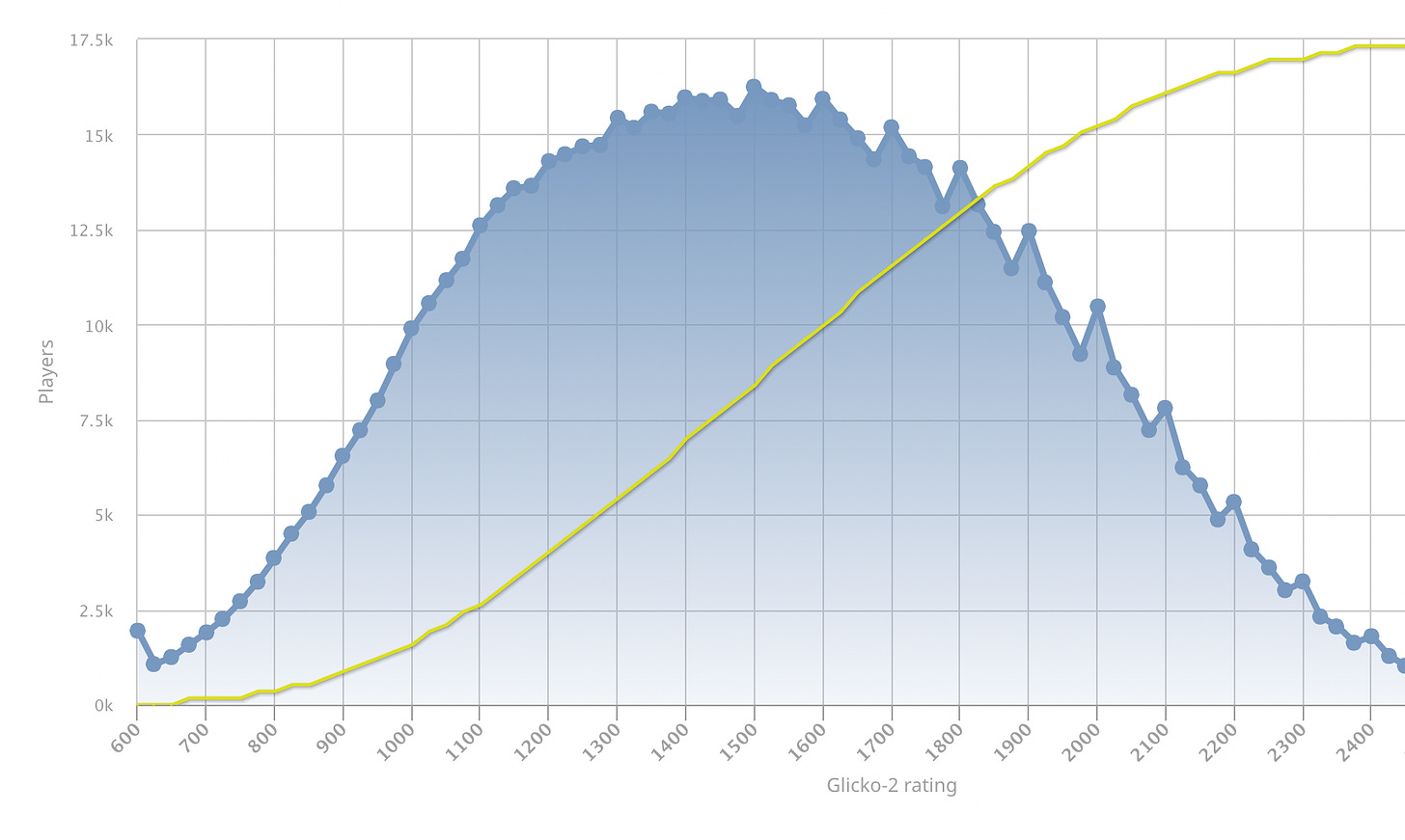I was so close to my goal of 2400 USCF, but from the first round, I could tell something was off. I was struggling to focus and missing obvious tactics. Sure enough, I lost the first game.
If it was a Swiss style tournament I might have gone home right there, but it was quads, meaning if I dropped two of my opponents would get one fewer game than they were expecting, so I toughed it out. I ended up going 0-3 and dropping 27 rating points. I wouldn’t manage to cross 2400 until almost a year later.
Tournaments like these tend to trigger a reckoning. Who cares about rating anyway? What difference would it actually make if I crossed 2400? How would my life change? Who even decided on a base ten number system?! The most enlightened thing would seem to be to ignore ratings altogether. And yet…

Very few chess players, in their heart of hearts, could honestly say they don’t care about their rating. In general it’s not helpful to be dishonest with yourself. So rather than pretend you don’t care about your rating, it would be better to find a healthy way to work with it.
If you really, truly don’t care at all about your rating, you can skip the rest of this article. But if you do, read on. Rating doesn’t have to be a negative factor. It can be something that motivates and inspires you.
Is your rating helping or hurting?
The best way to tell if your rating is working for you or against you is to ask yourself, Does thinking about my rating goal make me more or less motivated to play?
This is the distribution of ratings on Lichess. At first glance this looks pretty close to a normal distribution, but if you look closer you notice some odd little spikes on the right side of the graph. These occur at exact increments of one hundred - 1600, 1700, etc. It turns out that many people, when they hit a rating milestone, stop playing to “lock it in.”
This is the most extreme version of negative rating impact: Focusing on your rating causes you to stop playing chess entirely. But excessive focus on rating can also manifest in more subtle ways, possibly just by making it less fun to play.
If you want to opt out of ratings, you can actually sort of do that. Lichess has a setting that lets you turn off all ratings on the whole site. When I first turned this on it felt like a revelation. No more rating stress! But after awhile I started to get a curious, disembodied feeling. It was hard to say what exactly, but something seemed to be missing from my chess experience. In the end, I turned ratings back on.
Some people can truly play chess for fun without worrying about their level, result, or anything else. I admire that, but it’s not how I play. For me, thinking about training routines, mental habits, and opening repertoires is just as important as what happens on the board. Improvement is part of the game, and at the end of the day, rating is the best measure of whether or not you’re really improving. I think maybe I actually… like ratings?
How to make your rating work for you
Brad Stulberg says the best way to achieve a big goal is to break it down into steps, then forget about it and focus on the steps.

This worked for me when I was trying to get to 2700 blitz on chess.com. If I focused on my daily rating fluctuations it made me miserable, but when I mostly forgot about 2700 and just focused on my daily routine of playing and reviewing a few blitz games, everything fell into place. While it wasn’t my main daily focus, the rating goal still served an important purpose. Having that rating goal in the back of my mind helped chess feel more exciting and purposeful.
Your mileage may vary, but a thought that was helpful for me was, “I will get to 2700, it’s just a matter of time.” That helped me see rating dips not as setbacks, but as part of a larger journey, which would go where it needed to in the long run anyway.
tl;dr
Excessive focus on rating can be harmful, but caring about your rating is not inherently bad.
Set a rating goal - then forget it.
Focus on process goals, the things you can control day-to-day.
If you liked this post, why not share it with a friend?




Enjoyed your discussion of the value of a rating goal. Thanks
At the lower level for those adult improvers like myself I believe ratings are important. The higher the rating the less blunders and the more interesting the games. I would rather win or lose based on just a good game of outmaneuvering an opponent than through a silly error. As I Inch upward slowly I choose opponents a little higher rating level than myself - I only play correspondence chess on chess.com. My only goal is as one YouTube adult improver puts it ‘play good chess.’